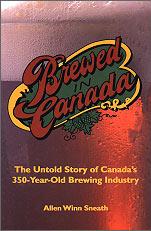 With all the reviews of whatever comes through the door I do, I should not forget some recent and not so recent books I have come to rely upon and give them an airing, too. Brewed In Canada subtitled “The Untold Story of Canada’s 350-Year-Old Brewing Industry” (a gift from two and a half years ago which was published in 2001) is one such reference guide that I pick up over and over when trying to figure out who was who where they were and what it was they were doing.
With all the reviews of whatever comes through the door I do, I should not forget some recent and not so recent books I have come to rely upon and give them an airing, too. Brewed In Canada subtitled “The Untold Story of Canada’s 350-Year-Old Brewing Industry” (a gift from two and a half years ago which was published in 2001) is one such reference guide that I pick up over and over when trying to figure out who was who where they were and what it was they were doing.
Sneath, the author, was one of the founders of the now departed Algonquin Brewing Company, one time holder of 1% of the Ontario beer market according to page 293. They made a beer called Hunt Club that was available in the mid-90s from Upper Ottawa Valley LCBO in one litre plastic bottles which was often seen in my fridge back then. Dandy stuff. Anyway, his real claim to beer historian fame as far as I am concerned is the one hundred plus page chronology at the end of the book in an appendix. This has served me well when I needed to confirm facts like PEI was the last province to end prohibition…in 1948!¹
The other 325 pages or so of this book is a standard history of the sort that pays more attention to the facts that have been gleaned than the sort that has an agenda in ordering those facts to make some sort of point as has been seen recently. It covers the early colonial period, the rise of regional breweries, the consolidations sparked by E.P. Taylor’s Canadian Breweries, the Dow beer non-tainting scandal of 1966 and on to the world of micro-brewing. While this book is comprehensive and certainly a must-have for any Canadian beer nerd, the book has one irritating feature – as pointed out by Bodensatz, it has no index! This means you have to go over it again and again to recover that fact bumping around at the back of your mind but given the quality of the book it is not such a bad fate.
I am not sure but this one may be now out of print but it is worth hunting out.
¹ No wonder the moonshine is so good and plentiful there. I seem to recall the drill was to ask for “St. Augustus” when at a kitchen party.
